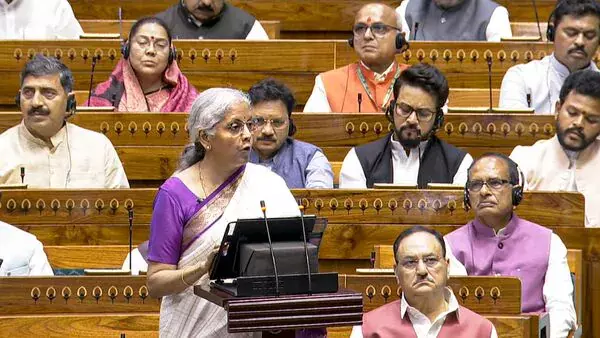
- Home
- India
- World
- Premium
- THE FEDERAL SPECIAL
- Analysis
- States
- Perspective
- Videos
- Sports
- Education
- Entertainment
- Elections
- Features
- Health
- Business
- Series
- In memoriam: Sheikh Mujibur Rahman
- Bishnoi's Men
- NEET TANGLE
- Economy Series
- Earth Day
- Kashmir’s Frozen Turbulence
- India@75
- The legend of Ramjanmabhoomi
- Liberalisation@30
- How to tame a dragon
- Celebrating biodiversity
- Farm Matters
- 50 days of solitude
- Bringing Migrants Home
- Budget 2020
- Jharkhand Votes
- The Federal Investigates
- The Federal Impact
- Vanishing Sand
- Gandhi @ 150
- Andhra Today
- Field report
- Operation Gulmarg
- Pandemic @1 Mn in India
- The Federal Year-End
- The Zero Year
- Science
- Brand studio
- Newsletter
- Elections 2024
- Events
- Home
- IndiaIndia
- World
- Analysis
- StatesStates
- PerspectivePerspective
- VideosVideos
- Sports
- Education
- Entertainment
- ElectionsElections
- Features
- Health
- BusinessBusiness
- Premium
- Loading...
Premium - Events

No one expects the Budget to be divorced from politics, but no one expects it to be suffused with politics so far away from the next general elections either
The Budget manages to be both populist and responsible. It would please the less well-off and leave the middle class angry over the sudden lopping off of the indexation benefit on capital gains on property and gold. But it would leave the really wealthy, more concerned about macroeconomic stability that allows wealth creation than about a few percentage points of tax outgo, heaving a sigh of relief.
Except for one thing. The Budget does not discuss how to deal with the challenge Indian industry faces from the massively state-subsidised Chinese industry, whose exports to India at cheap prices not just outcompete Indian offering in the present, but pre-empt the setting up of capacity for additional production in India for the future. Instead, the Budget tinkers around with individual rates of import duty, as if it were suddenly the 1980s, and finance ministers were experts in organic chemistry, naming chemicals in the petrochemical value chain, made by some local company or imported by another as a key raw material, the rivalry between the companies playing out in Parliament and the media.
Upholding fiscal discipline
Containing the fiscal deficit at 4.9 per cent of GDP and promising to bring it down to 4.5 per cent of GDP next year, the finance minister has laid the ground for stable prices and lower interest rates. The message would not be lost on the RBI.
Part of the deficit reduction from 5.5 per cent of GDP in the last fiscal has been achieved by reducing total expenditure, to 14.8 per cent of GDP, from 15 per cent of GDP in 2023-24. Counting the state governments as well, general government expenditure in India is well below 30 per cent of GDP. Government spending as a proportion of GDP is around 50 per cent in many rich countries, and well above 40 per cent in most advanced countries. The figure comes in under 40 per cent for the US. It is not an achievement for India to spend so little, when the areas awaiting improvement are so huge. The point is to spend more, but have the revenue to spend more as well, without having to borrow and crowd out the private sector from access to the available pool of savings.
India is gradually raising its tax/GDP ratio. For the Centre, it now stands at 11.7 per cent of GDP. For the Centre and the states together, the ratio is about 17 per cent of GDP. It is double that level for members of the rich country club, the OECD. The government cannot provide better and more services without collecting taxes to pay for them. Taxes have to go up, but not for those who already pay their taxes.
There is much income in India that escapes taxation. The point about GST is that it generates multiple audit trails that lead to income hidden in dark corners, improving the collection of both direct and indirect taxes. GST collections are booming, and so are personal tax and corporate tax collections.
Shadow of coalition politics
No one expects the Budget to be divorced from politics, but no one expects it to be suffused with politics so far away from the next general elections. With this government, expect the unexpected.
Removing the indexation benefit from capital gains tax on property and gold is a blow to the well-off. At the same time, all kinds of sops are offered to those who struggle to find jobs and make a living. The Budget is a declaration that it has heard the message of the elections loud and clear.
Another political facet is the special benefits to Bihar and Andhra Pradesh, dressed up, as these are, as tourism-building, industrial, logistics and other infrastructure investment for the eastern part of the country. The bulk of the funding would appear to come from multilateral development banks, in which case, other states would not be able to complain about their rightful funds being diverted to a politically sensitive region.
This government believes in programmes, not policy. The programmes are so numerous and so varied, and meant, probably, to sound good when they are announced, like the 100 smart cities scheme, or Save the Girl Child scheme, that few voters would care to recollect a few years later, what precisely has been promised. What is the point, then? Collectively, they send out the message that the government cares about the less well-off.
Addressing climate change
Some sensible things have been proposed. On climate change, a carbon market has been mooted, but the details might take a year or more to be worked out. Industry should take the initiative and help the government design one. It is the ideal response to Europe’s Carbon Border Adjustment Mechanism, not crying foul and rushing to the WTO.
A policy on pumped storage, to complement the huge investment taking place in renewable energy, is vital, but it has been proposed, but not yet ready for articulation. Renewable energy’s chief failing is that it is intermittent, and has to be supplemented with storage facility for the power generated. The foray into small modular reactors is wholly welcome.
But the failure to discuss plans to prevent the formation of urban heat islands, while discussing cities and peri-urbanisation, gives the impression that climate change is not yet an integral part of policymaking, but a silo that some experts will struggle with, without influencing urban planning, building codes, material specifications or municipal budgets. India will need to build large, air-conditioned community centres in a great many places, to save lives in a warming world.
Silence on Agniveer scheme
On defence, the silence on the Agniveer scheme, despite all the protests against it, must be accepted as a quiet win for the government. The government has to get out of spending the bulk of its defence outlay on salaries and pensions, and start spending money on strategic capability – weapons, rapid, mass transportation, the unified operations of the army, navy, the air force, cyber security and space actors.
A policy has been announced, to identify and enunciate the next lot of economic reforms. To a hungry man, a promise of food tomorrow is probably better than the stark absence of food in any form or tense.
Small and medium industry also have to get by with a lot of bank-linked support. Most do not have the luxury of bank loans. They need dynamic non-banking finance companies and a dynamic debt market that would feed these NBFCs. The Budget is oblivious to the sector’s real need.
Of course, economic policymaking does not begin or end with the Budget. So, let us take the Budget as a piece of fiscal responsibility, and keep seeking useful policy from the government.
(The Federal seeks to present views and opinions from all sides of the spectrum. The information, ideas or opinions in the articles are of the author and do not necessarily reflect the views of The Federal)


